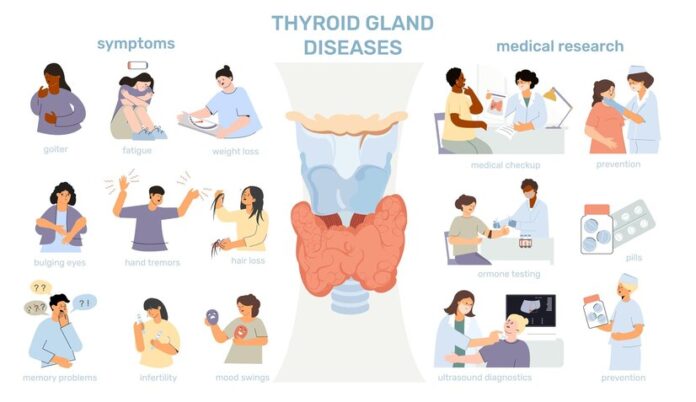Thyromegaly – The human body is a marvel of intricate design, with each organ vital in maintaining overall health. The thyroid gland holds a special place among these essential organs, as it influences numerous bodily functions. Thyromegaly, a condition characterized by an enlarged thyroid gland, is a topic of significant medical importance. In this article, we will explore thyromegaly’s causes, symptoms, and treatment options, shedding light on this condition and its impact on individuals’ health and well-being.
The Thyroid Gland: A Fundamental Overview
Before delving into thyromegaly, it is crucial to understand the thyroid gland’s role in the human body. The thyroid gland is a small, butterfly-shaped organ in the front of the neck, just below the Adam’s apple. Despite its relatively small size, the thyroid gland profoundly impacts various bodily functions, including metabolism, energy production, and the regulation of essential hormones.
Thyroxine (T4) and triiodothyronine (T3) are two key hormones that the thyroid gland produces. These hormones play a pivotal role in controlling the body’s metabolism. They influence how the body uses energy, regulates temperature, and maintains healthy heart and digestive functions.
Thyromegaly Defined: What Is It?
Thyromegaly, also known as goitre, is characterized by the abnormal enlargement of the thyroid gland. This enlargement can lead to complications and disrupt the gland’s ability to produce hormones efficiently. Understanding the causes, symptoms, and treatment options for thyromegaly is essential for individuals affected by this condition and for healthcare professionals tasked with managing it.
Causes of Thyromegaly
Thyromegaly can result from various underlying causes. Understanding these causes is critical for proper diagnosis and treatment. The primary causes of thyromegaly include:
- Iodine Deficiency: Iodine is an essential nutrient required to produce thyroid hormones. An enlarged thyroid gland might result from a diet low in iodine.
- Autoimmune Disorders: Conditions such as Hashimoto’s thyroiditis and Graves’ disease can trigger an autoimmune response that causes the thyroid gland to enlarge.
- Thyroid Nodules: Benign or cancerous nodules can form within the thyroid gland, causing it to become enlarged.
- Medications: Certain medications, including lithium and amiodarone, can induce thyromegaly as a side effect.
- Pregnancy: Some women may develop an enlarged thyroid gland during pregnancy due to hormonal changes.
- Infections: In rare cases, thyroid gland diseases can lead to inflammation and enlargement.
Symptoms of Thyromegaly
Thyromegaly can manifest with various symptoms, though not everyone with an enlarged thyroid gland experiences them. Common symptoms of thyromegaly may include:
- Swelling in the Neck: One of the most noticeable signs of thyromegaly is the swelling or enlargement of the thyroid gland in the neck, which can be visible or felt as a lump.
- Difficulty Swallowing or Breathing: In severe cases, an enlarged thyroid gland can pressure the nearby structures, causing difficulty in swallowing or breathing.
- Hoarseness: Pressure on the vocal cords from an enlarged thyroid gland can lead to changes in voice, resulting in hoarseness.
- Throat Discomfort: Some individuals with thyromegaly may experience a sensation of fullness or discomfort in the throat.
- Thyroid Dysfunction: In cases where thyromegaly disrupts thyroid hormone production, individuals may exhibit symptoms of hypo- or hyperthyroidism, such as fatigue, weight gain or loss, and changes in heart rate.
Diagnosing Thyromegaly
Diagnosing thyromegaly typically involves a combination of medical history, physical examination, and diagnostic tests. A healthcare provider will often start by feeling the neck for signs of enlargement and asking about symptoms. To confirm the diagnosis and determine the underlying cause, various tests may be conducted, including:
- Thyroid Function Tests: Blood tests measuring levels of thyroid hormones (T3 and T4) and thyroid-stimulating hormone (TSH) can help identify thyroid dysfunction.
- Ultrasound: A thyroid ultrasound provides images of the thyroid gland, revealing its size and any nodules or abnormalities.
- Fine-Needle Aspiration (FNA) Biopsy: If nodules are present, a small tissue sample may be examined to rule out cancerous growths.
- Radioactive Iodine Uptake Test: This test assesses how much iodine the thyroid gland absorbs, helping diagnose conditions like Graves’ disease.
Treating Thyromegaly: Approaches and Options
The treatment of thyromegaly depends on its underlying cause, the severity of symptoms, and the individual’s overall health. Several treatment options are available, each tailored to address specific aspects of the condition.
1: Observation and Monitoring
In cases of mild thyromegaly with no significant symptoms, a healthcare provider may recommend a wait-and-watch approach. Regular monitoring through physical exams and thyroid function tests can help track the gland’s size and function over time.
2: Medications
For individuals with thyromegaly caused by thyroid disorders like Graves’ disease, medications may be prescribed to manage symptoms and regulate hormone production. These medications may include antithyroid drugs or beta-blockers to control hyperthyroidism symptoms.
3: Iodine Supplementation
If iodine deficiency is the underlying cause of thyromegaly, supplementing the diet with iodine-rich foods or iodized salt may help reduce the gland’s size and improve thyroid function.
4: Surgical Intervention
Surgical removal of all or part of the thyroid gland may be necessary in cases of severe thyromegaly or when nodules are cancerous or causing significant symptoms. This procedure, known as thyroidectomy, can be performed as an open surgery or minimally invasive procedure.
5: Radioactive Iodine Therapy
Radioactive iodine therapy is a treatment option for individuals with hyperthyroidism caused by thyromegaly. This therapy involves ingesting a radioactive form of iodine, which selectively destroys thyroid tissue.
6: Alternative Therapies
Some individuals may explore complementary and alternative therapies, such as acupuncture or herbal supplements, to manage symptoms. However, consulting with a healthcare provider before pursuing such treatments is essential to ensure their safety and efficacy.
Living with Thyromegaly: Coping and Lifestyle Considerations
Dealing with thyromegaly can be challenging, but individuals can take steps to manage their condition and improve their quality of life. Here are some lifestyle considerations for those with thyromegaly:
- Medication Adherence: If prescribed medications, it is essential to take them as directed by a healthcare provider to manage symptoms and regulate thyroid function effectively.
- Dietary Choices: For individuals with iodine deficiency, incorporating iodine-rich foods like seafood, dairy products, and iodized salt into their diet can be beneficial.
- Stress Management: High levels of stress can exacerbate thyroid-related conditions. Practising stress-reduction techniques, such as meditation and yoga, may be helpful.
- Regular Follow-Up: Maintaining regular follow-up appointments with a healthcare provider is crucial to monitor thyroid function, gland size, and overall health.
- Support Groups: Joining support groups or seeking counselling can provide emotional support and help individuals cope with the challenges of living with thyromegaly.
Conclusion
Thyromegaly, or an enlarged thyroid gland, is a condition that affects numerous individuals worldwide. Understanding its causes, recognizing its symptoms, and exploring the available treatment options are vital steps in managing this condition effectively. With proper medical care and lifestyle adjustments, individuals with thyromegaly can lead healthy, fulfilling lives. If you suspect you may have thyromegaly or are experiencing symptoms related to thyroid dysfunction, consult a healthcare provider for a comprehensive evaluation and guidance on the most suitable treatment approach.

